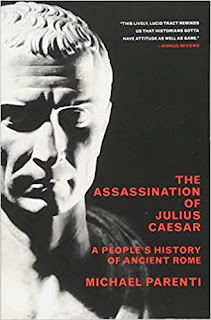Book Review: The Assassination of Julius Caesar: A People’s History of Ancient Rome
The Assassination of Julius Caesar: A People's History of Ancient Rome
By Michael Parenti
The New Press, 2003
276 pages
History
Review by Mark Polzin
“How many ages hence/Shall this our lofty scene be acted o’er” remarks Cassius after the murder of Caesar in William Shakespeare’s Julius Caesar (III.i.112-113). When that scene has been acted on stage or written about by historians, Caesar is generally depicted as a tyrant, and his assassins as defenders of republican liberties. In The Assassination of Julius Caesar: A People’s History of Ancient Rome, author Michael Parenti strongly challenges that portrayal. Parenti argues that Caesar was assassinated not because he was a tyrant that abused his power, but because he was a reformer who looked out for the common people of Rome. The wealthy elites of the Roman Senate struck him down to avoid sharing their own wealth and power as a result of future reforms like those Caesar had already implemented. The depiction of Caesar as a tyrant and the conspirators as saviors has been passed down by what Parenti calls “gentlemen historians” from ancient times to the present; wealthy, educated members of the upper classes with similar biases as those who conspired against Caesar.
Parenti convincingly offers a new perspective on Caesar, ancient Rome, and the study of history in general. He reminds readers that both in Caesar’s time and in the centuries that followed, history was generally written by those wealthy enough to have access to the necessary education. These “gentlemen historians” have usually written with the same upper class bias in their own times as those who compiled the ancient sources. Parenti orients readers to the class structure of Roman society, and to the wealthy few who took advantage of the less fortunate to enrich themselves. It was in their interest to paint anyone who passed reforms benefitting the masses, thereby redistributing some wealth and resources, as revolutionaries who intended to overthrow the Republic. As Caesar attained positions of greater power, he enacted many laws to make life less miserable for the masses, such as land reform, debt relief, and even expanded membership in the Senate. Parenti discusses popular reformers who preceded Caesar, including Tiberius and Gaius Gracchus and Catiline, whom the Senate labeled negatively as revolutionaries and then had murdered for their reforming efforts. Parenti’s ability to show Caesar’s murder as a continuation of that pattern strongly supports his argument.
The author also points out that the Senators who supposedly stood up for republican liberties by eliminating the most prominent popular reformers of their times did not hesitate to suspend the constitution and declare men like Sulla and Pompey dictators when it suited their interests. Under the emperors who came to power in the years after Caesar’s death, the Senate in fact saw its power erode to the point that it became little more than an advisory body. However, because the emperors increased the wealth of the elites at the top, they were content not to challenge the role or power of the emperors.
Parenti acknowledges that Caesar used corrupt and exploitive tactics to advance himself, taking advantage of the same practices many others did. He also could have enacted popular reforms with the intention of winning over the people and undermining the Senate, even though that intention was not yet fully evident. Parenti also concedes that Caesar acted like a king in many ways, and may not have intended to continue using his growing power for the people’s benefit.
One individual that deserves more attention in the book was Marcus Brutus, often considered the noblest of the assassins. Parenti glosses over Brutus, citing a couple of examples of Brutus’ Machiavellian side, but offers little else about him. A discussion of Brutus’ motives and behavior would have been fitting and interesting, given his status in history and the author’s perspective. Some readers may see Parenti’s overt criticism of the exploitive upper classes as deserved, while others may find it too subjective. Also, readers looking for new insights into the minute-by-minute details of the assassination itself will need to look elsewhere.
Parenti succeeded in making his text interesting and accessible for lay-readers; it is concise and makes for a quick read. This book rewards readers by exposing them to new ways of thinking about a fascinating period in history. It offers a perspective worth looking into, and that readers can easily connect to contemporary issues.

Comments
Post a Comment